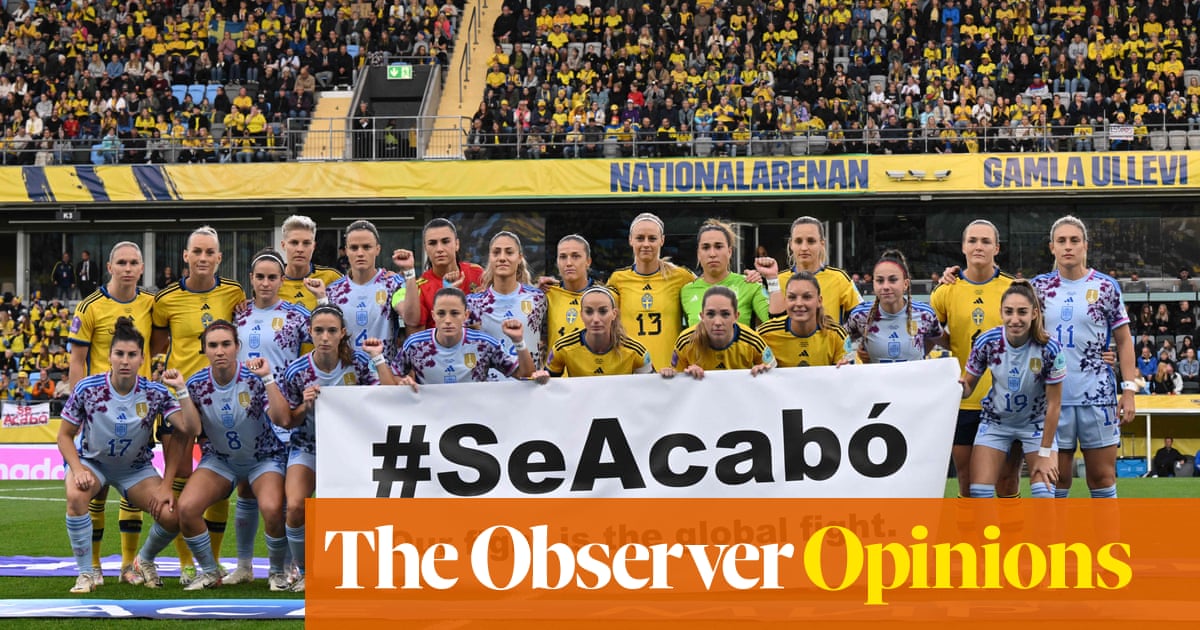
In Spain more than 1.4 million people watched the RTVE broadcast of the world champions’ first match since their triumph over England in Sydney 33 days ago. The 3-2 win over Sweden, a rematch of their World Cup semi-final, reached a peak audience of 3.47 million and had an 18.2% share of viewers, as Spain tuned in to see the impact on the pitch of a more than month-long battle off it.
The impact of the Spanish women’s team’s fight has gone far beyond their shores and borders though, and that was reflected in a very visual way in the opening round of Nations League and other international fixtures. Wrapped around the wrists of many players were bands of tape with “Se acabó” (it’s over) written on them in marker.
It was a coordinated effort; players clearly asked the Spaniards how they could show solidarity with their fight for respect and meaningful change in the federation after their World Cup win and the ensuing fallout resulting from the lewd actions of Luis Rubiales, the former Spanish football federation (RFEF) president.
The impact must not be underestimated, and it has gone far beyond football, too. The history of women’s football is peppered with stories of struggle and protest: for the right to equal or equitable pay, for facilities and equipment, for kit, for investment, for just the right to be able to play.
Players have protested, held sit-ins, defied bans, boycotted matches and used their voices in any way they can to push back on a plethora of issues that have arisen because history says women don’t and shouldn’t play football. The struggle of the Spanish players feels like a key moment in this rich history of struggle, the colliding of their “enough is enough” moment with a broader reckoning in society over women’s rights.
Their struggle is a decades-long fight, but it took the footage of Rubiales planting a kiss on the lips of Jenni Hermoso, grabbing his crotch in celebration and lifting Athenea del Castillo over his shoulder being seen across the globe for their voices of dissent to be taken seriously. Why were they not taken seriously sooner? Why were they dismissed as axe-grinders, of holding vendettas, of it being similar to a manager losing the dressing room in the men’s game, dismissed as a battle of wills?
Last week Channel 4’s Dispatches broadcast horrific accusations of sexual assault and rape made against Russell Brand, which he denies. Littered in comments on social media and more broadly was the question: “Why didn’t these women come forward sooner?” Just how joined up do the dots need to be? Look at Spain, look at what is happening right now, look at what it took for the Spanish players to have their complaints about the culture around the women’s team to be believed. They have been consistently raising concerns publicly since the 2015 World Cup and have been exiled and pilloried over and over again. It took the president of the federation visibly grabbing the face of Hermoso and kissing her on the lips for the penny to drop and for enough people, but far from everyone, to back the players and tip the momentum their way.
They are taking the responsibility to seize this moment of reckoning very seriously. When their previous manager, Jorge Vilda, was sacked, they could have stepped back, but they didn’t. When Rubiales eventually resigned, they could have stepped back, but they didn’t. Instead, they have collectively worked to crystallise their demands and make sure that the change they bring about isn’t superficial. They have recognised that beheading the king doesn’t bring about institutional change automatically, they have to continue to push for it.
Female football players, and women generally, are watching this process and learning from it. A scrap off the table here and there is not good enough, Spanish players are demanding they design the meal they are going to eat and dine at the table.
Now it is time to connect those dots, to recognise that none of the issues facing women exist in isolation from each other and to take a hard look at the system that allows the oppression of women to not just continue unabated but also be routinely defended.












